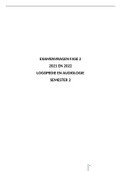PART 1] FOUNDATIONS
Chapter 1] Globalizing Business
IB
GB
MNE
FDI
BNP
BBP
BNI
koopkrachtpariteit
- triple bottom line
= performance along economic, social and environmental dimensions
- Liability of outsidership
= the inherent disadvantage outsiders experience in a new environment
1
,Globalization = a process leading to greater interdependence and mutual
awareness among economic, political and social units in the world,
and among actors in general - Mauro Guillén
- An institution-based view
-> formal rules (requirements to treat domestic and foreign rms as equals…)
-> informal rules (culture, norms values…)
=> suggest that the formal an informal rules of the game, know as
institutions, shed light on what is behind rms’ performance around the
globe (performance determined only by external environments)
- A resource based view
-> internal resources and capabilities
-> LOF = the liability of foreignness: the more a rm’s origins di er from the
host environment, the les the rm has experience in the host
country and the further away its nearest prior a liate
What is GLOBALIZATION?
=“ a process leading to greater interdependence and mutual awareness
(re exivity) among economic, political and social units in the world, and
among actors in general.” - Guillén
Globalization or Slowbalization?
The concept gross xed capital formation = domestic + foreign investment
3 views on globalization: 1] Friedman - the world is at -> globalization is
advanced and inevitable
2] Florida - the world is spiky -> globalization is
concentrated and stable
3] Ghemawat - semi-globalization -> globalization
is partial
2
fl fi fi fi fi fl ffi fi ff
,TNI
Unctad Transnationality index : arithmetic mean of 3 ratio’s
–> foreign assets/total assets
(For the top 100 TNC’s: –> foreign sales/total sales
mean TNI is 62.4%!) –> foreign employment/total employment
Chapter 2] Formal institutions : multinationals and the EU
Financial crisis of 2008: banks made major mistakes in their risk management
practices
-> combination of cognitive and normative pressures
3
, understanding institutions
The problem is not institutions (‘rules of the game’), but institutional transitions:
fundamental and comprehensive changes introduced to formal and informal rules of
the game that a ect rms als players
-> institution-based view: succes and failure of rms are enabled and
constrained by institutions
-> formal institutions: laws, regulations, and rules - may be imposed by home
countries and host countries
≠ norms: values, beliefs, and actions
- Regulatory Pillar = the coercive power of governments
- Normative Pillar = the mechanism trough which norms in uence individuals and
rm behavior
- Cognitive Pillar = the internalized, taken-for-granted values and beliefs that
guide individual and rm behavior
Institutions: reduce uncertainty
—> not static: evolve over time
= institutional transition = fundamental and comprehensive
change introduced to the formal and
informal rules of the game that a ect
organizations as players’
Institutional frameworks: reduce the potential for opportunistic behavior
4
ff fifi fi fi fl ff



